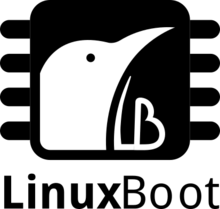LinuxBoot
LinuxBoot is a free software project aimed at replacing most of the DXE modules in UEFI firmware with the Linux kernel. LinuxBoot must run on top of hardware initialisation software in order to start. This can be the PEI part of UEFI, coreboot, or U-Boot.[1] It can boot Linux through the kexec syscall, but is also able to boot Windows with a different method.[2]
 | |
| License | GPLv2 |
|---|---|
| Website | linuxboot |
History
Originally, the project was started as NERF by Google.[3] NERF was a stripped down version of EFI which contains a Linux kernel and userland applications. This project has been split up into LinuxBoot (which contains the bootblock and kernel) and u-root, which contains the userland application.
LinuxBoot became an official Linux Foundation project in 2018.[4]
Hardware support
Currently, the EFI support of LinuxBoot is limited to a few servers:[5]
- Dell R630
- Open Compute Project Winferfell and Tioga Pass
- Intel S2600WF
LinuxBoot is in theory also supported on all the mainboards that are supported by the coreboot project, which does include the OCP Monolake.[6] In practice, the support is limited due to flash size constraints.
External links
References
- "Bringing Linux back to server boot ROMs with NERF and Heads". media.ccc.de.
- "LinuxBoot Continues Maturing - Now Able To Boot Windows - Phoronix". www.phoronix.com. Retrieved 2019-11-13.
- "LinuxBoot: Linux as firmware". LWN.net.
- "System Startup Gets a Boost with New LinuxBoot Project". Retrieved 3 February 2019.
- "LinuxBoot GitHub". GitHub. Retrieved 3 February 2019.
- "Mainboards supported by coreboot".